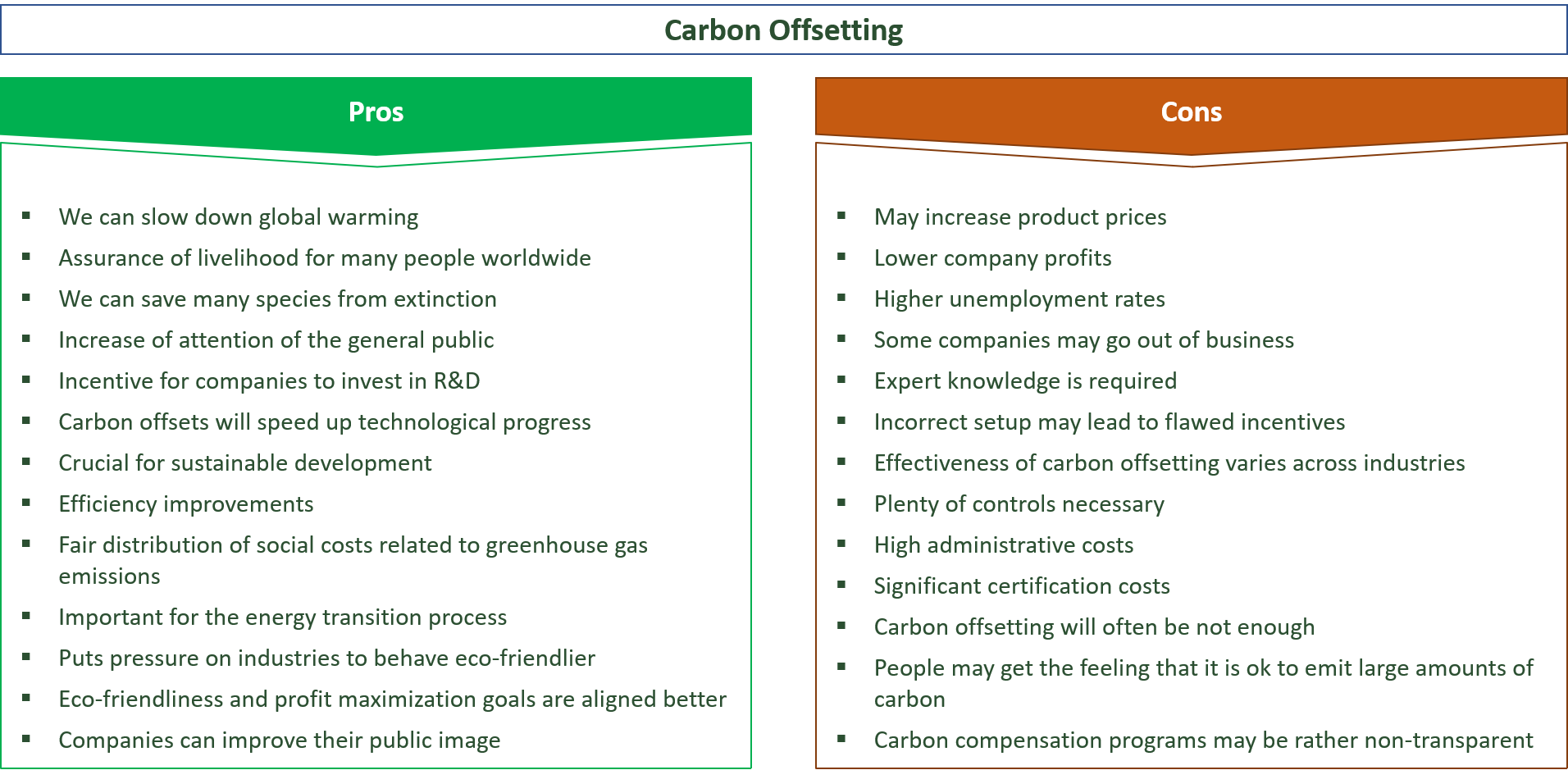“I believe in carbon offset initiatives, in eco-villages, in the sustainable regeneration of the tropical rainforest.”
Dasha Zhukova, Celebrity
Advantages & Disadvantages of Carbon Offsetting

Carbon offsets can be defined as the compensation for carbon dioxide emissions of one action A by the reduction of carbon dioxide or other greenhouse gases by another action B.
For instance, while you might emit carbon dioxide in one part of your daily life like commuting to work by car, you might be able to reduce carbon emissions by installing renewable energy sources at your home.
On a business level, this often means that companies buy carbon credits for their carbon emissions and the money collected is used to offset those greenhouse gas emissions, for instance through planting additional trees.
Therefore, carbon offsets play a quite important role in order to slow down global warming.
Yet, there are also some problems related to carbon offsetting.
In this article, the pros and cons of carbon offsets are examined.
Audio Lesson
Contents
Advantages of Carbon Offsetting
- We can slow down global warming
- Assurance of livelihood for many people worldwide
- We can save many species from extinction
- Increase of attention of the general public
- Incentive for companies to invest in R&D
- Carbon offsets will speed up technological progress
- Crucial for sustainable development
- Efficiency improvements
- Fair distribution of social costs related to greenhouse gas emissions
- Important for the energy transition process
- Puts pressure on industries to behave eco-friendlier
- Eco-friendliness and profit maximization goals are aligned better
- Companies can improve their public image
- Simple way for companies to offset their carbon emissions
- Carbon offsetting might give you a good feeling
We can slow down global warming
One major advantage of carbon offsetting is that it can be suitable to slow down global warming.
We all know that we do not have too much time left until it will be too late.
Since greenhouse gas emissions are a main driver for climate change, we all have to reduce our greenhouse gas emissions as best as possible.
This is not only true on an individual level, it is also crucial that companies contribute their part.
In order to make it more attractive for companies to reduce their greenhouse gas emissions, introducing carbon offsetting programs is a great way since companies will become more aware of the problem and will also try to reduce greenhouse gas emissions as best as possible so that profits can be maximized.
Assurance of livelihood for many people worldwide
Global warming will affect the poorest among us most.
This means while we in our Western world emit large amounts of greenhouse gases, billions of people in the Southern hemisphere will have to pay the piper in the near future.
Hence, in order to assure the livelihood of billions of people in the poor countries of our planet, it is crucial to introduce carbon offsetting programs so that people and companies have a bigger incentive to act in an eco-friendly manner.
We can save many species from extinction
Climate change is also quite harmful when it comes to the preservation of species.
Many animals and plants are quite sensitive to their natural living conditions and have adapted to those conditions for thousands or even millions of years.
Thus, a sudden increase in temperature over a rather short period of time may lead to the mass extinction of species, which we will never get back.
Therefore, if you want to be able to show your kids or your grandchildren a big variety of animals and plants in the future, you might also want to support carbon offsetting programs to protect those species from endangerment and extinction.
Increase of attention of the general public
Many people are still not too aware of the problem of global warming.
In fact, many people are so stressed in their daily life and do not want to deal with the climate change issue at all since they consider it not to be important.
However, through the introduction of carbon offsetting programs, it becomes more likely that those people get aware of the problem since those programs may have a direct impact on their finances and on their investment decisions.
Incentive for companies to invest in R&D
Another advantage of carbon offset programs is that they give companies the incentive to invest more money in research and development.
Since those programs make it more expensive to emit greenhouse gases into our atmosphere, companies will have a greater incentive to do extensive research on how to lower greenhouse gas emissions in order to avoid paying to much for those carbon offsetting programs.
Carbon offsets will speed up technological progress
Since companies are incentivized to spend more money on R&D, it becomes also more likely that technological progress will speed up.
This is quite important since we as humanity will only be able to solve our environmental problems if we continue to develop new sophisticated technologies on a consistent basis.
Thus, technological progress will not only benefit a few big corporations, but also the general public in various areas of daily life.
Crucial for sustainable development
We also have to make our lives more sustainable.
This means that we should not emit more greenhouse gases than our earth can handle in a healthy long-term manner.
In order to reduce greenhouse gas emissions and to make our production and consumption behavior more sustainable, it is crucial that carbon offsetting schemes are introduced to really push people into a more sustainable lifestyle.
Efficiency improvements
Carbon offsetting programs also have the potential to improve the overall efficiency of processes.
This also implies that the greenhouse gas emission process will be optimized in a way that every unit of unnecessary greenhouse gas emission will be avoided.
Over time, it is likely that our overall carbon emissions will significantly decrease.
Fair distribution of social costs related to greenhouse gas emissions
The implementation of carbon offsetting schemes will also contribute to fairer compensation for greenhouse gas emissions from a social perspective.
For instance, just a few years ago, it was possible for companies to emit large amounts of greenhouse gases literally without having to pay anything for it.
Yet, those greenhouse gases are extremely damaging and impose significant negative externalities on everyone of us, especially on poor people in the Southern hemisphere of our planet since those people will suffer the most from the adverse effects of climate change.
By charging money for greenhouse gas emissions through carbon compensation programs, companies now have to pay a higher share of the social costs that are related to greenhouse gas emissions.
Important for the energy transition process
We all know that in order to slow down global warming, it is also crucial that we transit from fossil to renewable energies as soon as possible.
In order to speed up this process, introducing carbon offsetting programs may be a valid tool to do so since companies are more likely to invest money in research regarding alternative energies.
Puts pressure on industries to behave eco-friendlier
In general, the pressure on several industries to behave environmentally-friendly can be increased significantly through carbon offsetting policies.
Companies now have a real incentive to act eco-friendly in order to assure their competitiveness.
Eco-friendliness and profit maximization goals are aligned better
Let’s be honest. Most companies out there are meant to make money and decision-makers in those companies will often act according to this profit-maximization goal.
Therefore, it is crucial to align the goal of eco-friendliness with the goal of profit maximization.
One way to do so is to introduce carbon offsetting schemes since companies will be able to increase their profits by reducing their emissions and therefore, carbon emissions are likely to decrease in a quite natural manner.
Companies can improve their public image
Through engaging in carbon offset policies, companies will also get the opportunity to strengthen their brand and their public image.
For instance, some companies are known to be rather eco-unfriendly.
However, those companies may be able to change their public image through those greenhouse gas offsetting programs, which may translate into higher profits in the long run.
Simple way for companies to offset their carbon emissions
Since the process behind carbon offsetting is rather straightforward, it provides companies with an easy way to compensate for their harmful effects on our environment.
Thus, engaging in those kinds of programs may be easier than setting up those programs by themselves, which can save significant administrative efforts and costs for those companies.
Carbon offsetting might give you a good feeling
If you or your company engages in carbon offsetting, you might also have a much better overall feeling since you may have a clean conscious.
Therefore, your overall quality of life may also increase due to that.

Disadvantages of Carbon Offsets
- May increase product prices
- Lower company profits
- Higher unemployment rates
- Some companies may go out of business
- Expert knowledge is required
- Incorrect setup may lead to flawed incentives
- Effectiveness of carbon offsetting varies across industries
- Plenty of controls necessary
- High administrative costs
- Significant certification costs
- Carbon offsetting will often be not enough
- People may get the feeling that it is ok to emit large amounts of carbon
- Carbon compensation programs may be rather non-transparent
May increase product prices
Although there are many advantages to carbon offsetting, there are also some problems related to it.
One downside of carbon offsetting is that it might increase product prices for us as consumers.
If companies have to pay more for carbon offsetting due to the production of certain goods which are carbon-intensive, chances are that those products will in turn become more expensive.
Thus, we as customers should expect a certain price increase in products that involve high levels of greenhouse gas emissions.
Lower company profits
In some industries, the profits of companies may also greatly drop due to the introduction of carbon offsetting programs.
This is especially true for companies who engage in a rather competitive or regulated space and will therefore not be able to increase product prices too much.
In turn, their profits as well as their competitiveness will likely suffer in the long run.
Higher unemployment rates
Due to the introduction of carbon offsetting programs, some people may also lose their jobs.
The production of some products may simply not be profitable anymore if carbon compensation payments are too high and therefore, workers who engage in the production of those products may be fired.
Hence, especially in structurally weak areas where unemployment already is a big problem, carbon offsetting schemes may even exacerbate this problem.
Some companies may go out of business
Some companies may even go out of business due to the implementation of carbon offsetting programs.
This will be especially true for companies that emit large amounts of greenhouse gases into the air and have to pay large sums of money to compensate for that.
Moreover, companies may also have to put in significant administrative work in documentation and control processes, which may especially problematic for smaller companies who often do not have the manpower for that.
Expert knowledge is required
In order to work properly and to reduce greenhouse gas emissions as best as possible, experts are needed to set up those carbon offsetting schemes so that companies are really incentivized to save carbon emissions on a large scale.
However, those industry experts are not cheap and governments around the world might have to spend plenty of money for those experts in order to create a functioning greenhouse gas offsetting framework.
Incorrect setup may lead to flawed incentives
Since those offsetting schemes are rather new and there are not many empirical values regarding the true effects of such measures, the incorrect setup of those schemes may lead to flawed incentives for companies and the real goal to reduce greenhouse gas emissions may not be accomplished.
Thus, it is crucial to monitor how those schemes work out so that governments can adjust those schemes if needed.
Effectiveness of carbon offsetting varies across industries
Those carbon offsetting programs might also be much beneficial in some industry branches than in others.
For instance, while carbon-intensive industries will likely greatly reduce their emissions due to the introduction of those carbon offsetting schemes, other industries that are not carbon-intensive at all might not need those programs at all.
Hence, a certain level of differentiation might be needed across industries in order to avoid high administration and documentation efforts for companies in industries that actually do not need those schemes at all.
Plenty of controls necessary
In order to make those offsetting programs work, plenty of controls will be necessary in order to guarantee that companies pay an adequate amount of money in line with their carbon emissions.
This also implies plenty of effort for regulators to monitor those schemes, which can also be considered to be quite inefficient.
High administrative costs
Due to the controls that are necessary for monitoring and controls related to carbon compensation schemes, the costs to do all this work will also be significant.
Many people have to be employed who carry out controls and document their findings.
Thus, the use of those policies may also imply significant public costs that have to be borne by the taxpayer.
Significant certification costs
Companies might also need certain certifications that they comply with the introduced carbon offsetting programs.
This may also lead to significant additional costs for companies since those certificates may have to be renewed and controlled from time to time.
Hence, there might also be significant amounts of unproductive work related to the implementation of carbon offsetting schemes.
Carbon offsetting will often be not enough
Even though carbon offsetting schemes can be regarded to be one step in the right direction, it might not be enough to offset carbon.
Instead, additional measures might be necessary to further reduce greenhouse gas emissions and to slow down global warming and its related adverse effects.
People may get the feeling that it is ok to emit large amounts of carbon
People may also get a certain feeling that carbon emissions don’t matter as long as they are compensated.
However, this is kind of flawed logic.
Although we can offset carbon emissions to a certain extent, it is still crucial that we further reduce our carbon footprint in order to slow down global warming.
Carbon compensation programs may be rather non-transparent
Although many companies already engage in carbon offsetting programs, those programs are often quite non-transparent and it takes plenty of experience to understand how those schemes exactly work.
Thus, for the general public, it is almost impossible to understand the mechanisms underlying those schemes in detail and we therefore have to rely on the knowledge of regulators to set up those policies in a proper manner.

Top 10 Carbon Offsetting Pros & Cons – Summary List
| Carbon Offsetting Pros | Carbon Offsetting Cons |
|---|---|
| Slow down global warming | Increase in product prices |
| Protection of species | Some companies may go out of business |
| Fairer distribution of the costs of emissions | Higher unemployment rates |
| Higher investments in R&D | Lower profits |
| Faster technological progress | Extensive knowledge is required |
| Efficiency improvements | High administration costs |
| Puts pressure on companies to go eco-friendly | Additional effort for companies |
| Profit maximization & eco-friendliness aligned | May not be enough to mitigate global warming |
| Simple and straightforward concept | Controls necessary |
| Promotes sustainable behavior | May not be necessary for all industries |
Conclusion
Carbon offsetting has many advantages and is one step in the right direction in order to reduce our greenhouse gas emissions and to slow down global warming.
However, additional measures are needed and we all should reduce our greenhouse gas emissions whenever possible in our daily life in order to ensure a livable future for the next generations.
Sources
https://en.wikipedia.org/wiki/Carbon_offset
https://www.carbonfootprint.com/carbonoffset.html
https://co2.myclimate.org/en/flight_calculators/new

About the author
My name is Andreas and my mission is to educate people of all ages about our environmental problems and how everyone can make a contribution to mitigate these issues.
As I went to university and got my Master’s degree in Economics, I did plenty of research in the field of Development Economics.
After finishing university, I traveled around the world. From this time on, I wanted to make a contribution to ensure a livable future for the next generations in every part of our beautiful planet.
Wanna make a contribution to save our environment? Share it!